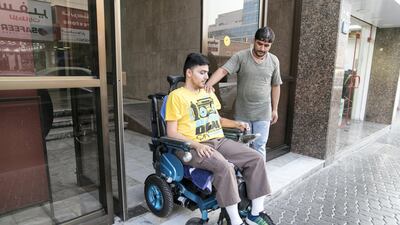Wheelchair users in the UAE continue to struggle for access due to high kerbs, confined entry to public spaces, shops and limited seating at the movies.
People with special needs are calling on developers and construction companies to test designs with them before finalising projects to make easy access a byword.
While navigating motorised wheelchairs on Dubai's busy streets, they say they have to ask for help from passers-by to heave them up onto pavements with high kerbs.
Others must sit in the first row of cinema theatres every time they watch a movie since there is no space for wheelchairs at the back of some halls.
“I can’t stand on my own but I like going out on my own or with friends,” said Sharan Budhrani who has muscular dystrophy and uses a wheelchair.
“After the construction of the metro, things are changing for people in wheelchairs but it’s still a struggle when the footpaths are too high or in shops that are not inside malls. I go on the road with cars around and it’s not safe to be on the roads with other traffic.”
On his Facebook page, Sharan’s Life with Muscular Dystrophy, he posts photos of trouble spots in the city that require better access, not just for wheelchairs but for prams and the elderly.
His comments reached the Roads and Transport Authority, which added pedestrian crossings near his home in Deira, lowered the footpath near the BurJuman metro station and placed a ramp near the Ibn Batuta mall parking area.
A movie buff, Sharan enjoys watching films but must select cinemas where the entrance to the hall is at the top, with open space for wheelchairs.
At Vox Cinemas in the Mall of the Emirates he must always sit in the front row and in Reel Cinemas in Dubai Mall he has missed movies when the chair lift is either not operational or staff are not trained to use it.
Michelle Walsh, chief operating officer, Majid Al Futtaim Cinemas – VOX Cinemas, said that they were conscious of every aspect of a guest’s experience.
“For our disabled guests we’re in the process of updating all seat maps for better visibility, both in-cinemas and online, of where wheelchair-friendly seating is available. This is currently rolled out at our City Centre Deira cinema and we’re working on the same for our locations across the UAE,” she said.
Adon Quinn, senior director at Reel Cinemas, a subsidiary of Emaar Entertainment, said it was implementing measures to make the Dubai Mall cinema enjoyable for hearing and visually impaired guests and would build on this in the drive for Dubai to become one of the world’s most disabled friendly cities by 2020.
“We offer services to help with accessibility for all of our patrons. For visitors requiring wheelchair access, we also provide dedicated seating areas in each cinema, with great views of the cinema screens,” he said.
When a chair lift was not functioning, Sharan was given complimentary tickets.
“I’m not asking for anyone’s sympathy and some people are really helpful and kind. I have accepted my condition for years now,” he said.
“It’s nice to go out and watch movies but when I’m with friends and I have to sit in the front row, it’s not comfortable and too close to the screen.”
Experts said companies must be proactive in responding to issues flagged by disabled people.
_______________
Read more:
Dubai to retrofit thousands of buildings to improve disabled access
Disabled code for Dubai buildings on track
_______________
The Dubai Universal Design Code states that new buildings and transportation systems should be designed, constructed and managed to enable people with disabilities to independently use facilities.
“Sitting in the front row is the last place that anyone would want to be. Obviously the ideal scenario would be that somebody with any kind of disability will have the chance to turn up and use the facility just like anybody else without advance notice,” said Elie Ghoussoub, principal consultant health, safety and accessibility with WSP, which provides design and engineering solutions.
“When you and I go to the movie theatre, we don’t call them up and tell them we are coming. A movie theatre can put in place portable ramps, platform lifts or removable seats to accommodate wheelchairs.”
Confidence and independence was fundamental for people with special needs, said Shobhika Kalra, founder of Wings of Angelz, an advocacy group that has helped build more than 700 ramps over the past three years in Dubai.
“I ask for help when the pavement is too high, it doesn’t affect me to ask for help. But some people in wheelchairs feel they shouldn’t go out in case they will get stuck. They can be hesitant to venture outdoors,” said Shobhika, who has Friedreich’s ataxia, a rare disorder impairing muscle coordination.
“Going out on my own adds to my confidence. You may think, 'what is she talking about,' but sub-consciously it makes a difference to us to go anywhere we want. Accessibility is very important to us.”
The implementation of codes and regulations will be discussed at the Future Accessibility Summit in Dubai on October 8 and 9.
.


